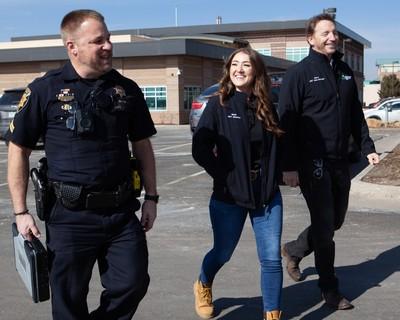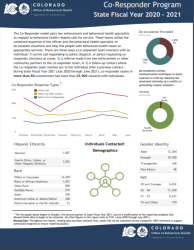The Co-Responder model of criminal justice diversion pairs law enforcement and behavioral health specialists to intervene and respond to behavioral health-related calls for police service. These teams utilize the combined expertise of the officer and the behavioral health specialist to de-escalate situations and help link individuals with behavioral health issues to appropriate services.
The program and team structure varies between locations to best meet the needs of the community and the partnering agencies, taking population density and other available resources into consideration.
There are generally two approaches: 1) an officer and behavioral health specialist ride together in the same vehicle for an entire shift, or 2) the behavioral health specialist is called to the scene, and the call is handled together.
On scene, the team works not only to de-escalate the situation, but also provide behavioral health screening and assessment, call disposition planning and referral or linkage to needed services. The planning at the end of the encounter depends on a number of unique factors, and outcomes can range from leaving the individual with necessary resources, transporting the individual to a hospital or walk-in clinic, and providing support and resources for family members and others on-scene.
Programs also follow up with individuals after they leave the initial encounter. This varies by program: some programs follow up as a team, while others send dedicated case management services. Programs often work with other community resources, providing coordination with various systems of care.
Co-Responder Programs also offer formal and informal cross-training between the law enforcement and behavioral health disciplines that generally leads to greater understanding and shifts agency culture.
Download
Co-Responder Program Description - February 2023
Co-Responder Outcomes - October 2021
Supporting Coloradans Experiencing Crisis
Among more than 25,900 calls fielded by OBH-funded co-responder teams between July 2020 and June 2021, 98% avoided arrest, according to OBH data. In that same timeframe, co-responders provided some form of service to individuals on 86% of active calls, including behavioral health assessments and referrals to community resources. Read our Colorado Health Institute evaluation and this fact sheet for more information on call outcomes.
Read Testimonials from Police Departments and Sheriff's Offices

Check out open co-responder team positions below! To apply, scroll to the Job Posting Link column (the furthest to the right) to find the job link.
Frequently Asked Questions
- What is a Co-Responder Program?
-
The Co-Responder model pairs law enforcement and behavioral health specialists to respond to behavioral health related calls for police service. These teams utilize the combined expertise of the officer and the behavioral health specialist to de-escalate situations and help link people with behavioral health issues to appropriate services.
- Do all Co-Responder programs look the same?
-
No. While they all have the same basic elements, there are different approaches programs can take to meet the needs of the community in the most efficient way. The two most common approaches are:
- A dedicated team of one or more officers paired with one or more behavioral health specialists who ride together in the same vehicle for all or most of a shift. Some programs include other emergency response professionals, such as paramedics. Generally, this dedicated team only responds to behavioral health related calls, and the officer does not perform the regular duties of a patrol officer.
- The behavioral health specialist is requested to respond to the scene and handles the call with the officer. Generally this approach, most or all officers on duty can request assistance from the behavioral health specialist.
- How can I request a Co-Responder Team response?
-
If your community has a Co-Responder Program, you can always ask for a co-responder or mental health team response if you call your local police department or 911 because of a behavioral health crisis or matter.
Please keep in mind that availability of the programs vary by agency. If the team is not available to respond, your local police department may have Crisis Intervention Team (CIT) officers available who can respond, in which case you may request that a “CIT officer” respond if available. To learn more about CIT in Colorado, please visit https://www.citac.co.
- How can I find out more about my community’s program?
-
If there is no active behavioral health emergency, you can reach out to the police department directly and ask for more information.
- How does OBH fund Co-Responder Services?
-
Most of the Co-Responder Services are funded from the Marijuana Tax Cash Fund (39-28.8-501 C.R.S). There are four ways Co-Responder Services are funded.
- SB 17-207 (Strengthening Colorado’s Statewide Crisis Response to Behavioral Health Crises) authorized the development and implementation of eight new Co-Responder Programs throughout Colorado. OBH currently has contracts with eight local government agencies through June 30, 2022 with an allocated amount of $2.9 Million per year.
- Offender Behavioral Health Services funding also supports a number of programs. OBH contracts directly with community mental health centers. For more information about Offender Behavioral Health Services funding, please go to the OBHS page.
- $400,000 per year has been allocated from the Mental Health Block Grant to help support two programs.
- SB 19-008 (Concerning Treatment of Individuals with Substance Use Disorders Who Come Into Contact With the Criminal Justice System) authorized the development and implementation of five new Co-Responder Programs throughout Colorado. OBH currently has contracts with five local government agencies through June 30, 2024 with an allocation of $1.4 million per year.
- What communities in Colorado have Co-Responder Services funded through OBH?
-
Adams County
- Westminster Co-Responder Program: Westminster Police Department in partnership with Community Reach Center.
- AllHealth Network partners with the law enforcement agencies for each of the following programs:
- Englewood Co-Responder Program
- Littleton Co-Responder Program
- Greenwood Village Co-Responder Program
- Sheridan Co-Responder Program
- Glendale Co-Responder Program Aurora Crisis Response Team (CRT): a partnership between Aurora Mental Health Center and Aurora Police Department.
- Longmont CORE: within the Longmont Department of Public Safety.
- Boulder County Co-Responder Program: A partnership between Boulder County Community Services, Boulder County Sheriff’s Office (serving unincorporated Boulder County and Superior), LaFayette Police Department, Erie Police Department, and Nederland Police Department.
- Broomfield B-CORE: Broomfield Police Department in partnership with Community Reach Center.
- Chaffee County Co-Responder Program: A partnership between Solvista Health, Buena Vista Police Department, Chaffee County Sheriff’s Office and Salida Police Department
- Montrose & Delta Co-Responder Program, Center for Mental Health Co-Responder Program - Delta County: a partnership between Axis Health, the Center for Mental Health, and Delta Police Department and Delta County Sheriff’s Office, with coverage extending into Cedaredge, Hotchkiss and Paonia.
- Denver Substance Use Navigators: Managed by the City and County of Denver’s Department of Public Health and Environment in partnership with Denver Health and Denver Police Department.
- Denver Crisis Intervention Response Unit (CIRU): A partnership between WellPower and Denver Police Department.
- Douglas County Crisis Response Team (CRT): a partnership between Douglas County, Douglas County Sheriff’s Office, Parker Police Department, Castle Rock Police Department, Lone Tree Police Department, and Caring Communities, LLC; this includes two Youth CRT teams that respond in schools throughout the county.
- Eagle County Mobile Crisis Co-Responder Program: a partnership between Vail Police Department, Avon Police Department, Eagle Police Department, Eagle County Sheriff’s Office, Eagle County Paramedic Services, and Your Hope Center.
- El Paso County Behavioral Health Connect (BHCON): A partnership between El Paso County Sheriff’s Office and UC Health.
- Colorado Springs Community Response Team (CRT): A partnership between Colorado Springs Police Department, Colorado Springs Fire Department, and Diversus Health.
- Canon City Co-Responder Unit: A partnership between Cañon City Police Department and Solvista Health.
- Arvada Co-Responder Program: within the Arvada Police Department.
- Lakewood Co-Responder Program: A partnership between Jefferson Center for Mental Health, and Lakewood Police Department.
- Lake County and Leadville Co-Responder: A partnership between Solvista Health, Lake County Sheriff’s Office, and Leadville Police Department.
- Larimer Interagency Network of Co-Responders (LINC): a partnership between Larimer County, Larimer County Sheriff’s Office, and Loveland Police Department.
- Estes Park Co-Responder Program: A partnership between SummitStone Health and Estes Park Police Department.
- Grand Junction Crisis Support Team: Grand Junction Police Department in partnership with Mind Springs Health.
- Montrose & Delta Co-Responder Program: A partnership between Axis Health, Montrose Police Department, and Montrose County Sheriff’s Office.
- Pitkin Area Co-Responder Team (PACT): A partnership between Pitkin County Public Health, Pitkin County Sheriff’s Office, Aspen Police Department, Snowmass Village Police Department, and Mind Springs Health.
- Pueblo CIT Co-Responder Program: A partnership between Health Solutions and Pueblo Police Department.
- Summit County System-wide Mental Assessment Response Team (SMART): Summit County Sheriff’s Office, including coverage for all Summit County municipalities.
- Greeley Evans Mobile (GEM): A partnership between Evans Police Department, Greeley Police Departments, and North Range Behavioral Health.
- Community Action Collaborative: A partnership between North Range Behavioral Health, Greeley Fire Department (community paramedic), Greeley and Evans Police Departments, and Northern Colorado Health Alliance.
- North Weld County Co-Responder: A partnership between North Range Behavioral Health, Ault Police Department, Eaton Police Department, Nunn Police Department, Severance Police Department and Windsor Police Department
- Rocky Ford Police Department, Otero County Sheriff’s Office, La Junta Police Department, Prowers County Sheriff’s Office, Lamar Police Department, Granada Police Department, Crowley County Sheriff’s Office, Baca County Sheriff’s Office, Springfield Police Department, and Walsh Police Department.

